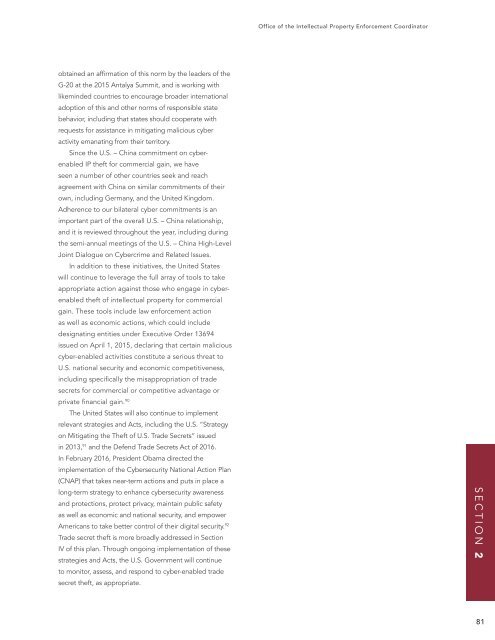ENFORCEMENT
eop_ipec_jointstrategicplan_hi-res
eop_ipec_jointstrategicplan_hi-res
You also want an ePaper? Increase the reach of your titles
YUMPU automatically turns print PDFs into web optimized ePapers that Google loves.
Office of the Intellectual Property Enforcement Coordinator<br />
obtained an affirmation of this norm by the leaders of the<br />
G-20 at the 2015 Antalya Summit, and is working with<br />
likeminded countries to encourage broader international<br />
adoption of this and other norms of responsible state<br />
behavior, including that states should cooperate with<br />
requests for assistance in mitigating malicious cyber<br />
activity emanating from their territory.<br />
Since the U.S. – China commitment on cyberenabled<br />
IP theft for commercial gain, we have<br />
seen a number of other countries seek and reach<br />
agreement with China on similar commitments of their<br />
own, including Germany, and the United Kingdom.<br />
Adherence to our bilateral cyber commitments is an<br />
important part of the overall U.S. – China relationship,<br />
and it is reviewed throughout the year, including during<br />
the semi-annual meetings of the U.S. – China High-Level<br />
Joint Dialogue on Cybercrime and Related Issues.<br />
In addition to these initiatives, the United States<br />
will continue to leverage the full array of tools to take<br />
appropriate action against those who engage in cyberenabled<br />
theft of intellectual property for commercial<br />
gain. These tools include law enforcement action<br />
as well as economic actions, which could include<br />
designating entities under Executive Order 13694<br />
issued on April 1, 2015, declaring that certain malicious<br />
cyber-enabled activities constitute a serious threat to<br />
U.S. national security and economic competitiveness,<br />
including specifically the misappropriation of trade<br />
secrets for commercial or competitive advantage or<br />
private financial gain. 90<br />
The United States will also continue to implement<br />
relevant strategies and Acts, including the U.S. “Strategy<br />
on Mitigating the Theft of U.S. Trade Secrets” issued<br />
in 2013, 91 and the Defend Trade Secrets Act of 2016.<br />
In February 2016, President Obama directed the<br />
implementation of the Cybersecurity National Action Plan<br />
(CNAP) that takes near-term actions and puts in place a<br />
long-term strategy to enhance cybersecurity awareness<br />
and protections, protect privacy, maintain public safety<br />
as well as economic and national security, and empower<br />
Americans to take better control of their digital security. 92<br />
Trade secret theft is more broadly addressed in Section<br />
IV of this plan. Through ongoing implementation of these<br />
strategies and Acts, the U.S. Government will continue<br />
to monitor, assess, and respond to cyber-enabled trade<br />
secret theft, as appropriate.<br />
SECTION 2<br />
81


